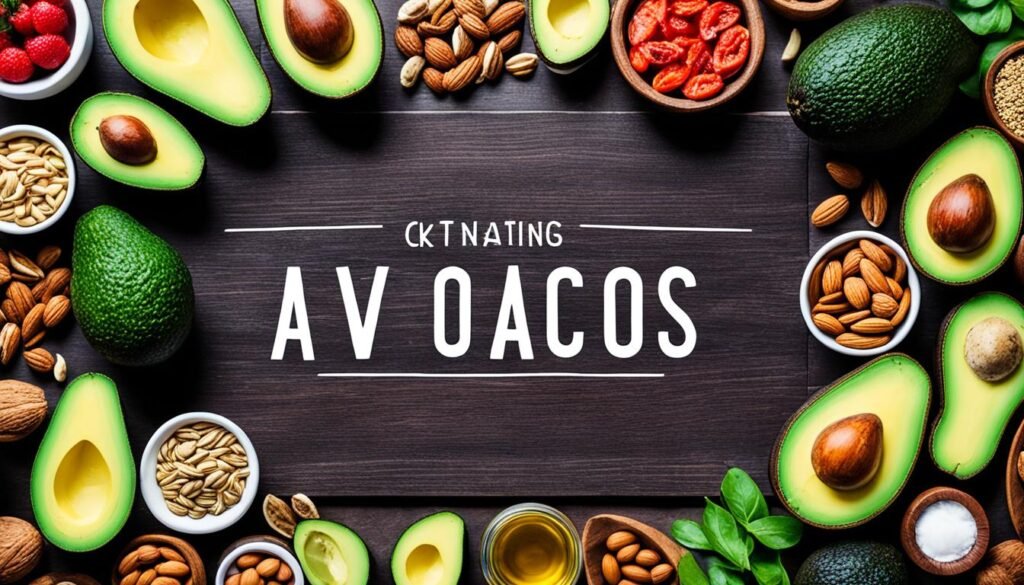
The ketogenic diet has gained immense popularity in recent years, hailed as a powerful tool for weight loss and improved health. However, with its rise in fame, numerous myths and misconceptions have emerged, often clouding the true understanding of this dietary approach. In this article, we aim to debunk these common keto myths and provide you with accurate information about the ketogenic diet so you can make informed choices about your health and wellness.
Key Takeaways:
- There are several myths surrounding the ketogenic diet that need to be debunked.
- One myth is that the ketogenic diet leads to ketoacidosis, which is not true.
- Going on and off the keto diet can lead to weight regain, contrary to popular belief.
- Carb needs on the ketogenic diet vary depending on individual factors.
- The ketogenic diet is not an excuse to consume unlimited amounts of bacon and butter.
Myth 1: Your Body Goes Into Ketoacidosis
One common myth about the ketogenic diet is that it causes the body to go into ketoacidosis, a potentially dangerous condition. However, this is not true. The ketogenic diet promotes ketosis, a metabolic state where the body uses fat for fuel instead of glucose. Ketoacidosis, on the other hand, occurs in individuals with uncontrolled diabetes and is unrelated to the ketogenic diet.
Ketoacidosis is a serious condition characterized by high levels of ketones and acid in the blood. It can lead to severe health complications, including organ failure. However, this condition is primarily associated with uncontrolled diabetes, not the controlled state of ketosis induced by the ketogenic diet.
In contrast, ketosis is a natural metabolic state that occurs when carbohydrate intake is significantly reduced, and the body begins to burn fat for energy. During ketosis, the liver produces ketones, which are used as an alternative fuel source. This can result in fat burning and may lead to weight loss.
The ketogenic diet is designed to achieve and maintain ketosis by limiting carbohydrate intake. By consuming high amounts of healthy fats, moderate protein, and very low carbohydrates, the body is encouraged to enter a state of ketosis. This promotes fat burn and can lead to numerous health benefits, including weight loss, improved cognitive function, and enhanced energy levels.
“Contrary to popular belief, ketosis is a safe and natural metabolic state that can be achieved through a well-planned ketogenic diet.”
Benefits of Ketosis:
- Increased fat burning
- Improved insulin sensitivity
- Enhanced mental clarity
- Reduced inflammation
- Stabilized blood sugar levels
It is important to note that while ketosis is generally safe and beneficial for many individuals, it may not be suitable for everyone. It is advisable to consult with a healthcare professional or registered dietitian before starting a ketogenic diet, especially for individuals with underlying health conditions or those taking certain medications.
| Ketosis | Ketoacidosis |
|---|---|
| Safe metabolic state | Dangerous condition |
| Occurs during the ketogenic diet | Primarily associated with uncontrolled diabetes |
| Promotes fat burn for energy | High levels of ketones and acid in the blood |
| May lead to weight loss and improved health | Can result in severe health complications |
Myth 2: You Can Go On and Off Keto and Still Keep the Weight Off
One common myth surrounding the ketogenic diet is the notion that you can easily go on and off the diet without experiencing weight regain. However, this is not the case. Repeatedly transitioning in and out of a ketogenic state, also known as keto cycling, is more likely to result in weight regain over time. To maintain the benefits of sustained ketosis, consistency is key.
When you follow a ketogenic diet, your body shifts from using glucose as its primary source of energy to utilizing fats. This metabolic change leads to weight loss and other health benefits. However, if you continuously disrupt this process by frequently going off the diet, your body may struggle to maintain ketosis, which can ultimately hinder your weight management goals.
Consistency is crucial for achieving long-term success with the ketogenic diet. By adhering to the principles of the diet consistently, you allow your body to fully adapt to ketosis and optimize fat burning for sustained weight loss. Additionally, maintaining a stable state of ketosis can help regulate appetite, control cravings, and promote a healthier relationship with food.
Instead of approaching the ketogenic diet as a temporary solution, it’s important to view it as a lifestyle change. Embrace the principles of the diet as a sustainable way of eating that aligns with your health goals. By adopting this mindset and committing to the ketogenic lifestyle, you can increase your chances of maintaining weight loss and reaping the long-term benefits of ketosis.
To illustrate the risks of transitioning in and out of ketosis, consider the following example:
| Scenario | Outcome |
|---|---|
| Keto Cycling: Going on and off keto every few weeks | Weight regain due to the body’s inability to fully adapt to ketosis and rely on fats as a fuel source. |
| Consistent Ketogenic Diet: Following the diet consistently | Sustained weight loss and improved metabolic health due to the body’s optimal utilization of fats for energy. |
By understanding the myth of easily transitioning in and out of ketosis without consequences, you can make informed decisions about your diet and strive for long-term success with the ketogenic lifestyle. Remember, it’s not just about reaching your weight loss goals; it’s about maintaining them over time.

Myth 3: Everyone Has the Same Carb Needs
One of the common myths surrounding the ketogenic diet is the belief that everyone has the same carb needs. However, this couldn’t be further from the truth. The amount of carbohydrates one can consume while still maintaining ketosis varies from person to person based on several factors, including individual health and physical activity levels.
Unlike traditional diets that prescribe a fixed carb intake, the ketogenic diet requires an individualized approach. It’s essential to consult with a registered dietitian who specializes in ketogenic nutrition to determine the appropriate carb intake for optimal results.
Working with a dietitian will allow you to fine-tune your carb needs and create a personalized eating plan that aligns with your goals and requirements.
Incorporating the right amount of carbs into your ketogenic diet is crucial for achieving and sustaining ketosis, which is the metabolic state where your body primarily burns fat for fuel instead of glucose.
Factors Affecting Carb Needs
When determining your carb needs on the ketogenic diet, several factors come into play:
- Health condition: Certain health conditions may require stricter carbohydrate restrictions, while others may allow for a slightly higher carb intake.
- Physical activity: Individuals who engage in intense physical activity may need a slightly higher carb intake to support their energy needs.
- Weight loss goals: The desired rate of weight loss can influence the recommended carb intake. Those aiming for rapid weight loss may need to lower their carb intake further.
By considering these factors and working closely with a dietitian, you can determine the ideal carb range that allows you to reach and maintain ketosis while still meeting your nutritional needs.
| Factors | Recommended Carb Intake (in grams) |
|---|---|
| Health Condition | Varies based on individual needs and medical guidance |
| Physical Activity | Around 20-50 grams per day for moderate activity levels |
| Weight Loss Goals | Varies based on the desired rate of weight loss |
Remember, the ketogenic diet is not a one-size-fits-all approach. It requires customization to ensure success and maintain optimal health. By tailoring your carb intake to your individual needs, you can maximize the benefits of the ketogenic diet and achieve your personal goals.
Myth 4: Keto Gives You Permission to Eat as Much Bacon and Butter as You Want
Contrary to popular belief, the ketogenic diet does not give you free rein to consume unlimited amounts of bacon and butter. While the diet is high in fats, it is important to prioritize healthy, unsaturated fats over saturated fats. This means incorporating sources like avocados, olive oil, and nuts into your diet.
While bacon and butter may be allowed on the keto diet due to their low carbohydrate content, consuming excessive amounts of saturated fats can have negative health implications. Saturated fats are typically solid at room temperature and are commonly found in foods like red meat, butter, and full-fat dairy products. These fats can increase LDL cholesterol levels, which may increase the risk of heart disease.
On the other hand, unsaturated fats like those found in avocados, olive oil, and nuts are considered healthier options. Unsaturated fats are usually liquid at room temperature and can have positive effects on heart health when consumed in moderation. They can help lower LDL cholesterol levels and provide essential fatty acids that are beneficial for overall health.
To ensure a well-rounded and balanced keto diet, it is important to include a variety of healthy fats. Here are some examples of healthy, unsaturated fats that can be incorporated into your meals:
- Avocado: Avocados are rich in monounsaturated fats, which are heart-healthy fats. They can be enjoyed as a spread, added to salads, or used to make guacamole.
- Olive oil: Olive oil is a staple in Mediterranean cuisine and is packed with monounsaturated fats. Use it in salad dressings, sautéing vegetables, or as a dip for bread.
- Nuts and seeds: Almonds, walnuts, chia seeds, and flaxseeds are excellent sources of healthy fats. They can be eaten as snacks, added to smoothies, or sprinkled on top of salads.
By focusing on incorporating these healthy, unsaturated fats into your ketogenic diet, you can promote better heart health and overall well-being. Remember that moderation is key, and it is always advisable to consult with a healthcare professional or registered dietitian before making any significant changes to your diet.

Myth 5: Because Veggies and Fruits Can Be High in Carbs, You Can’t Eat Them on Keto
Contrary to the belief that fruits and vegetables cannot be consumed on a ketogenic diet due to their carb content, they can actually be included in moderation to provide essential nutrients and prevent constipation, a common side effect of the keto diet.
While some fruits and vegetables do contain carbohydrates, there are plenty of options that are low in carbs and can still be enjoyed on a keto diet. Non-starchy vegetables such as leafy greens, broccoli, cauliflower, and zucchini are excellent choices as they have a minimal impact on blood sugar levels. Additionally, low-carb fruits like berries (such as blueberries, raspberries, and strawberries) can be incorporated into the diet, as they are packed with antioxidants and fiber.
Eating produce on a keto diet is important for several reasons. Firstly, vegetables and fruits provide vital vitamins and minerals that contribute to overall health and well-being. Secondly, the fiber content in these plant-based foods promotes healthy digestion and prevents constipation, which can sometimes occur due to the low-fiber nature of the keto diet.
To help you understand how certain fruits and vegetables fit into a ketogenic diet, here is a table showcasing their carb content per 100 grams:
| Fruit/Vegetable | Carbohydrate Content (g) |
|---|---|
| Spinach | 1.4 |
| Kale | 4.42 |
| Broccoli | 6.64 |
| Cauliflower | 4.97 |
| Blueberries | 14 |
| Raspberries | 12.23 |
| Strawberries | 7.68 |
Key Takeaways:
- Non-starchy vegetables and low-carb fruits can be included in a ketogenic diet.
- These plant-based foods provide essential nutrients, antioxidants, and fiber.
- Consuming produce on a keto diet helps prevent constipation, a common side effect.
- It’s important to be mindful of the carb content of fruits and vegetables when incorporating them into a ketogenic meal plan.
Myth 6: A Keto Diet Is a Plan That Is High in Protein
Contrary to popular belief, a ketogenic diet is not primarily focused on high protein intake. Instead, the main emphasis of a keto diet is on limiting carbohydrate consumption to achieve a state of ketosis. Consuming excessive amounts of protein can actually interfere with the ketosis process and lead to a spike in blood sugar levels.
It is crucial to moderate protein intake while following a ketogenic diet and prioritize quality sources of protein. This includes lean meats, poultry, fish, and plant-based protein options such as tofu or tempeh. Consulting with a registered dietitian can provide personalized recommendations and help you navigate the appropriate protein intake for your specific needs.
| Benefits of Moderating Protein Intake on Keto: | Drawbacks of Excessive Protein on Keto: |
|---|---|
|
|
By striking the right balance and moderating protein intake, you can optimize your ketogenic diet experience and ensure you are reaping the full benefits of ketosis.
Myth 7: The Keto Diet Is the Best Way to Lose Weight
The widespread belief that the ketogenic diet is the ultimate solution for weight loss is not entirely accurate. While the keto diet can indeed lead to weight loss for some individuals, it is not a one-size-fits-all approach.
Weight loss is a complex journey that varies from person to person. What works for one individual may not work for another. It’s essential to recognize that sustainable weight management involves finding an eating plan that is personalized and tailored to your specific needs and goals.
Many factors contribute to successful weight loss, including genetics, lifestyle, metabolism, and overall health. It’s crucial to consider these factors when embarking on a weight loss journey. A personalized diet allows you to address your unique circumstances and create a plan that works best for you.
Remember, sustainable weight loss is not just about shedding pounds quickly. It’s about making long-term lifestyle changes that you can maintain over time. A personalized approach ensures that you can stick to your diet and achieve lasting results.
When designing your personalized weight loss plan, it’s crucial to consult with a registered dietitian or healthcare professional. They can provide valuable guidance and support, taking into account your individual needs, preferences, and any underlying health conditions.
“Weight loss is not a race or a competition. It’s a journey of self-discovery and self-care. Embrace your uniqueness and find the eating plan that helps you thrive.” – Dr. Sarah Murphy
Key Takeaways:
- The ketogenic diet is not the best weight loss solution for everyone.
- Weight loss requires a personalized approach that considers individual factors and goals.
- Long-term success comes from adopting a sustainable lifestyle, not just quick fixes.
- Consulting with a healthcare professional or registered dietitian is crucial when designing a personalized diet plan.
| Myth | Reality |
|---|---|
| The keto diet is the best way to lose weight. | Weight loss is individualized, and the keto diet may not suit everyone’s needs. |
| One-size-fits-all approaches lead to long-term weight management success. | Personalized diets that consider individual factors and goals are key to sustainable weight loss. |
| Quick weight loss is the ultimate goal. | Long-term lifestyle changes and sustainable habits are essential for lasting weight management. |
Conclusion
In conclusion, it is important to debunk the common myths surrounding the ketogenic diet in order to fully understand its benefits and limitations. By separating fact from fiction, individuals can make informed decisions about their dietary choices and achieve their health and wellness goals.
The first myth we debunked is the belief that the ketogenic diet causes the body to go into ketoacidosis, a dangerous condition. In reality, the diet promotes ketosis, a metabolic state that facilitates fat burn. Ketoacidosis is unrelated to the ketogenic diet and is only a concern for individuals with uncontrolled diabetes.
Another myth is that you can go on and off the keto diet without regaining the weight. However, repeatedly engaging in keto cycling is more likely to result in weight regain. Consistency is key to maintaining the benefits of sustained ketosis.
It is also a myth that everyone has the same carb needs on the ketogenic diet. The appropriate carb intake for maintaining ketosis varies depending on individual factors such as health and physical activity levels. Consulting with a dietitian is recommended to determine the right carb intake for optimal results.
Contrary to popular belief, the ketogenic diet does not give you permission to eat unlimited amounts of bacon and butter. It is important to prioritize healthy, unsaturated fats and incorporate sources like avocados, olive oil, and nuts into your diet.
While fruits and vegetables can contain carbs, they can still be included in a ketogenic diet. Non-starchy vegetables and low-carb fruits like berries provide essential nutrients and fiber. Eating produce is important to prevent side effects such as constipation.
The misconception that the ketogenic diet is high in protein is also debunked. The focus of the diet is on low-carb intake, not excessive protein consumption. Moderating protein intake is important for maintaining ketosis and stable blood sugar levels.
Finally, the idea that the ketogenic diet is the best way to lose weight is a myth. There is no one-size-fits-all approach to weight loss, and finding an individualized eating plan that suits your specific needs and goals is key.
By debunking these common keto myths, individuals can fully understand the ketogenic diet, make informed choices, and optimize their health and wellness journey.
FAQ
Does the ketogenic diet cause the body to go into ketoacidosis?
No, ketoacidosis is unrelated to the ketogenic diet. Ketoacidosis occurs in individuals with uncontrolled diabetes, while the ketogenic diet promotes ketosis, a metabolic state where the body uses fat for fuel instead of glucose.
Can you go on and off the ketogenic diet without regaining weight?
No, repeatedly going on and off the keto diet, or engaging in keto cycling, is more likely to result in weight regain. Consistency is key when it comes to maintaining the benefits of sustained ketosis.
Do carb needs on the ketogenic diet vary for different individuals?
Yes, the amount of carbs one can consume while still maintaining ketosis depends on various factors, such as individual health and physical activity levels. It is recommended to work with a dietitian to determine the appropriate carb intake for optimal results.
Can you consume unlimited amounts of bacon and butter on the ketogenic diet?
No, while the diet is high in fats, it is important to prioritize healthy, unsaturated fats over saturated fats. This means incorporating sources like avocados, olive oil, and nuts into your diet.
Can you include fruits and vegetables in a ketogenic diet?
Yes, while fruits and vegetables can contain carbs, non-starchy vegetables and low-carb fruits like berries can be consumed in moderation to provide essential vitamins, antioxidants, and fiber. Eating produce is important to prevent constipation, a common side effect of the keto diet.
Is the ketogenic diet high in protein?
No, the ketogenic diet is focused on low-carb intake rather than high protein. Consuming excessive protein can interfere with ketosis and increase blood sugar levels. It is important to moderate protein intake and consult with a registered dietitian for personalized recommendations.
Is the ketogenic diet the best way to lose weight?
No, there is no one-size-fits-all approach to weight loss. The key to successful weight management lies in finding an individualized eating plan that is sustainable and suits your specific needs and goals.
RELATED POSTS
View all



